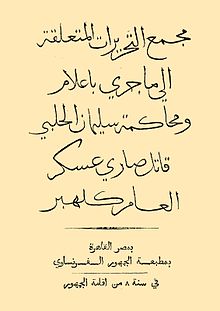Abd al-Rahman al-Jabarti
Abd al-Rahman al-Jabarti | |
|---|---|
Egyptian history | |
| Alma mater | Al-Azhar University |
| Muslim leader | |
Disciples | |
Abd al-Rahman al-Jabarti (1753–1825) (
Biography

Little is known of al-Jabarti's life. According to Franz Steiner, he was born in the village of Tell al-Gabarti in the northern
Al-Jabarti was born into a prominent family of
Abd al-Rahman visited the
He began keeping a monthly chronicle of local events, from which he compiled his three most famous works. The last and lengthiest of these documents, in
Jabarti maintained a strict, puritanical tone in his reaction to his witnessing of the advanced military technology, material sciences and cultural values of the
"strike their tongues with dumbness … confound their intelligence, and cause their breath to cease"[17]
Works

Al-Jabarti is known for three works: Tarikh muddat al-faransis bi-misr (The History of the Period of the French Occupation in Egypt), completed in late 1798; Mazhar al-taqdis bi-zawal dawlat al-faransis (Demonstration of Piety in the Demise of French Society), completed in December 1801; and ‘Aja’ib al-athar fi’t-tarajim wa’l-akhbar (The Marvellous Compositions of Biographies and Events), which was much longer and comprised elements from his first two works.
See also
References
- ISBN 978-0-87140-373-5.
- ^ a b Wilfrid Scawen Blunt (1923). My diaries; Being a Personal Narrative of Events. p. 81.
- ISBN 9781902669779.
- ^ al-Jabarti, 'Abd al-Rahman. History of Egypt: 'Aja'ib al-Athar fi 'l-Tarajim wa'l-Akhbar. vol.1. Franz Steiner Verlag Stuttgart. 1994.
- ^ Abdulkader Saleh, "Ǧäbärti," in Uhlig, Siegbert, ed., Encyclopaedia Aethiopica: D-Ha. Wiesbaden: Harrassowitz Verlag, 2005, p. 597.
- )
- ^ a b Huart, Clément (1903). "A History of Arabic Literature". New York, Appleton. p. 423.
- ^ Hassan al-Jabarti
- ISBN 9780313317408.
- ISBN 9780313317408.
- ^ Mohamed Haji Mukhtar (1987). "Arabic Sources on Somalia" (PDF). p. 149. Archived from the original (PDF) on 2012-04-26. Retrieved 2014-05-31.
- ^ David Ayalon, "The Historian al-Jabartī and His Background," Bulletin of the School of Oriental and African Studies, University of London, 1960, p.238
- ^ )
- S2CID 162747847.
- ISBN 9780871403735, 6 and 33.
- ISBN 978-0-87140-373-5.
- ISBN 978-0-87140-373-5.
- OCLC 1004556269.)
{{cite book}}: CS1 maint: location missing publisher (link) CS1 maint: multiple names: authors list (link
Further reading
- Karabell, Zachary (2003). Parting the desert: the creation of the Suez Canal. Alfred A. Knopf. ISBN 0-375-40883-5.
- Jabartī, ʻabd al-Raḥmān; Al-Jabarti, Sheik (1798). Napoleon in Egypt: Al-Jabarti's Chronicle of the French Occupation. Translated by Shmuel Moreh. ISBN 1-55876-070-9.
External links
- Napoleon in Egypt : Al-Jabartī's chronicle of the French occupation, 1798, Markus Wiener Publishers, 2006
- Aja'ib al-athar fi'l-tarajim wa'l-akhbar (in Arabic)
- "Jabarti, Abd al-Rahman al-" in Oxford Dictionary of Islam
